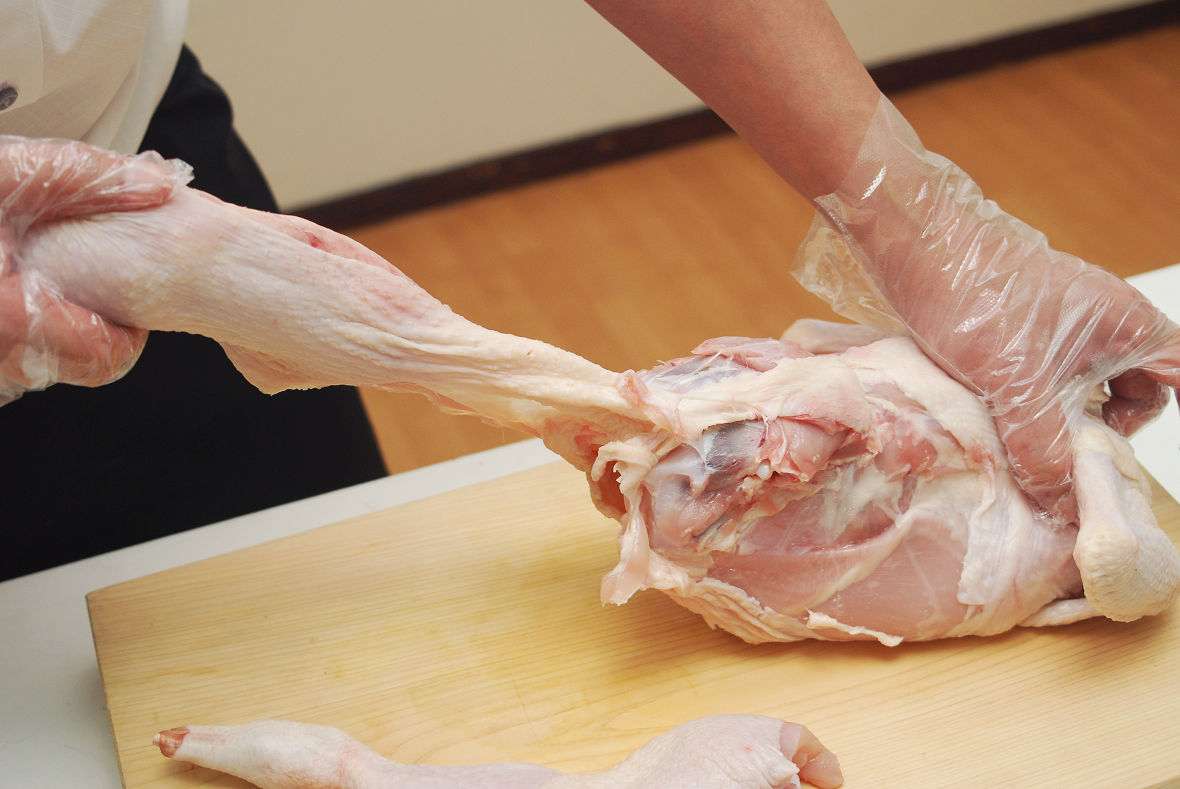Do you like chicken?
Chicken is eaten worldwide, for example fried/steamed chicken, Cacciatore, Yurinchi and chicken curry. It is also popular in Japan and commonly used in various menu at restaurants or homemade dishes.
Especially Yakitori, one of representative Japanese food, is popular among foreigners and always ranked high.
This time we would like to show you how to cut and separate the chicken carcass, as prerequisite knowledge prior to cooking Yakitori.
What is Needed?

You need a boning knife, plastic gloves, and kitchen towel.
This time we use chicken with guts, neck and legs removed.
A boning knife which is devised for preparing chicken or other meat should be used.

A boning knife is originally devised for cutting meat off bones. However, it is convenient for other purposes, and some people use it for cutting fish. It can be used not only for chicken, but also for any meat such as beef, pork, and lamb. The blades of boning knives are thicker and heavier than ordinary knives. It can cut with less strength and more resistant to hard substances.

Plastic gloves should be used not to touch meat directly. This is because not all bacteria can be removed from hands even though you wash them again and again. Meat touched by hands will be contaminated by bacteria and will go bad soon.
Now let’s get it started!
Cut Apart Chicken

Before starting, wipe off water on the surface and inside of chicken. If it’s wet, the knife will be slippery and also trigger bacteria proliferation.
1. Cut Off the Tail

Turn the chicken face up and cut off the tail. The tail, called “Bonjiri”, is very juicy and popular when it comes to Yakitori. Bonjiri is a precious part as each bird has only one tail.
2. Cut Off Thigh Meat

After the tail, cut off the thigh meat. First cut in the groin area and make a cut only in the skin.

Next, hold both legs and fold them towards the back. This is to dislocate the bones from the hip joint. Then pull each leg in turn.

When you pull each leg as shown in the picture, the thigh would easily come off. Cut the remaining skin to complete!

The thigh can be used for Cacciatore and poulet basquaise. If you want to cook Yakitorii, the thigh should be cut open.

Make a cut along the bone to the middle of the thigh.

Once you find the biggest bone, pull it backward to remove. If you cut tendons, then bone will be removed just by pulling it.

Next, to remove the small bones above the ankles, first slap the ankles with the end of the boning knife. When you hear a crack, just pull the bone and it will be easily removed. Cut off the part below the ankles and to complete!

The joint part of the big bone cut earlier has cartilage around, which is popular for its crunchy texture.

Now the chicken is separated into 3 parts – opened thigh, removed 2 bones, and ankles. We are done for thigh meat.
3. Cut Off Chicken Breast and Wings

Next, we are going to cut out breast. This time, turn the chicken face down. When you touch the body as shown in the picture, you’ll find a ditch. Make a cut from the ditch to ribs.

It is important to put the knife along the ribs in order to not waste any meat.

The same as when cutting the thigh, when you pull the wings, the breast will come off. Cut the remaining skin to complete.

In the picture above, aligned are the skin of breast, breast, and wings. The wings should be cut with the joint part attached. Cut the cartilage. No strength is needed. If the knife doesn’t go in smoothly, change the position and try again.
Wings are not used for Yakitori, so it’s better to use them for stews or something. Just repeat the same process on the breast and wings on the other side.
4. Cut Off Chicken Tender
Tender is under breast. It is less fat and healthy, and popular for those who go on a diet. It can be easily removed if you make a cut along the bone around. Make sure to handle it gently. Just like the breasts, 2 tenders can be taken from a chicken.

5. The Rest of Carcass

On the rest of carcass, there is still some meat usable for Yakitori. First put the knife in the scapula as if sliding it under the scapula.

As a chicken had 2 scapulae, cut in both. When you pull them, the rest of carcass will be separated into 2 parts.

As shown in the picture, there are some skin left. These skins can be used for Yakitori, called “Torikawa”. Bevel cartilage, diaphragm and Sot-l'y-laisse are also edible. Sot-l'y-laisse is a French word meaning “Those who leave this are fools”. It is called “Sori” in Japan.

First, cut off the bevel cartilage, called “Yagen”. Yagen is very precious part as each chicken has only one Yagen. It is white or translucent, located under the breastbone in the middle. It can be easily cut off with a knife.

Next, cut off the diaphragm. There are membranes in both sides as shown in the picture. Put the knife in the base of membranes to cut them off. They are juicy and good for Yakitori or stir-fry.

Finally, cut off the Sot-l'y-laisse, which lies in the pelvis and needs cutting carefully.

Do not try to dig it out. Make cuts in the surrounding area little by little. Once it’s done, we’re done with everything.
The Body Parts Cut Off from a Chicken

Let’s see the parts we’ve cut off. As shown in the picture above, here’re 2 thighs, 2 breasts and 2 tenders. Among these, only thighs can be used for Yakitori. Breasts and tenders are ideal for steamed/boiled dishes or stews.

Then we've got rest bones, skin (in upper middle), bevel cartilage, diaphragm, Sot-l'y-laisse, tail (in upper right), and wings. Except for rest bones and wings, they are all used for Yakitori.

Finally, here’re meat scraps cut off from the rest bones (in left), knee cartilage (upper in the middle), ankles (lower in the middle), and leg bones (in right). As well as rest bones, ankles and leg bones are good for making soup stock.
Now the preparations for making yakitori are complete! Stay tuned for our next blog in which we are going to show you how to cook Yakitori!




